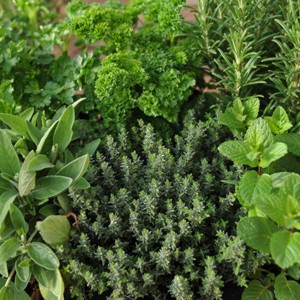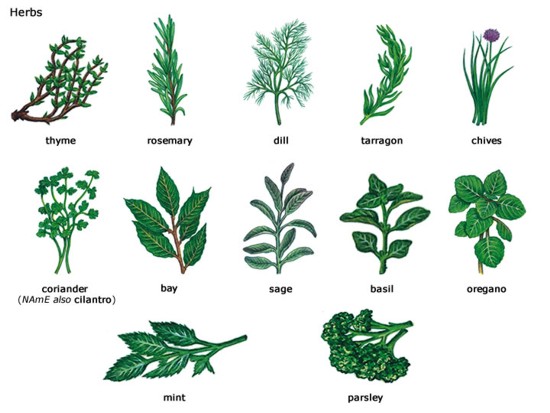We kicked off our Fall Harvest Tips series recently with my take on how to deal with the inevitable Tomato Tsunami. Today, we’ll tackle another Harvest Time Embarrassment of Riches: What to do with all the lovely fresh herbs still growing like weeds in the far back corner of your bounteous garden!
Whatever you do, don’t just leave them there to die on the stem and return to compost, whence they came! you can dry and store almost every herb you can grow in your garden!
Start at the beginning…
This year, we grew Sage, Rosemary, Oregano, Basil, Winter Thyme, Lemon Thyme, traditional Crinkly Parsley and Italian Flat Leaf Parsley. We had Chives, too. They come back on their own every year and are the first thing to sprout in our Herb Garden each spring. But Chives are also the first thing to shoot up to seed and die off, as soon as the daytime temperatures rise to the normal sultry summer range in June or early July. So, we’ve already dealt with our usual bounty of one of the world’s favourite flavourings for Salad Dressings, Marinades and other applications where you want just a mild hint of Oniony goodness…
Anyway… We can dry and bottle all of the other Herbs that are coming to their seasonal climax now and no special equipment or skills are required!
Here we go…
First, bring out all your pizza pans and cookie sheets, or as many as you think you’ll need to spread your herb harvest for drying. Line them with parchment paper. (Brits call it ‘grease-proof’ paper). Then go out to the garden with a couple of large baskets or steel mixing bowls and a pair of sturdy kitchen scissors.
Clip off each stem of herbs just above the second set of mature leaves up from the bottom. Check each for any evidence of black spots (mould) or die-off. Discard any leaves with black spots. If only the tips of dried-out leaves are effected, retain those ones and trim off the dead bits later. Bundle each type pf Herb with string near the bottom of the stems and place in a bowl or basket. You’ll be surprised how fast the bowls and baskets fill up!
Wash each bundle of Herbs gently in cold water, in a colander using your kitchen sink sprayer or a gentle trickle of water straight from the tap. Then, undo the bundles and arrange the herbs – still on their stems – in a single layer on one of your papered trays to dry. Twelve hours later, they will be dry to the touch. Twelve more hours will see them starting to wilt with some smaller leaves (such as Oregano) already be noticibly dry, on their ay to crispy, concentrated deliciousness.
Large, moist and meaty leaves such as Sage and Basil will take longest to dry. Medium-sized leaves such as Parsley, Cilantro and Tarragon will take correspondingly less time to dry. Oddballs such as Rosemary will dry according to the size of their leaves. Last year the biggest leaves I got on my Rosemary were around 1/2 in. / 1 cm. This year, they’re pushing 2 in. / 5 cm on average! For predictable results,try to get the same variety of each of your fave Herbs each year…
Let them dry thoroughly…
Just make sure that your herbs are thoroughly dry before removing them from their stems and/or crushing them to flakes. I prefer to leave my her leaves whole to p[reserve their flavours. It just takes up a little more space in the jar. The important thing is to use glass preserving jars with air-tight canning lids. Keep your dried herbs under a good seal in an air-tight container will help them last all winter in all their flavourful and aromatic glory!
And there you have it!
One Parsley plant will provide enough dried leaves to fill a 1 qt. / 1 L preserving jar. that’s more than enough to last a family all winter; probably until the new crop starts to come in the following June! Two Thyme plants, half a dozen Basil plants one Oregano plant, a couple of Tarragon plants or a couple of Cilantro plants will give you an equal harvest if you plant them in good soil on a south-west facing garden, and make sure they get lots of water.
Now… Go enjoy a nice afternoon in the garden and an evening in the kitchen, preserving your Herb bounty!
~ Maggie J.


